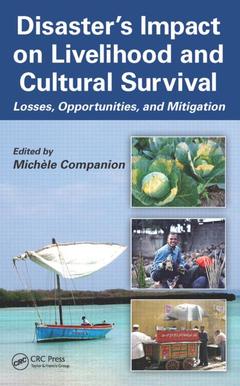Disaster's Impact on Livelihood and Cultural Survival Losses, Opportunities, and Mitigation
Coordonnateur : Companion Michele

Many facets of disasters generate interest among scholars and practitioners. However, a vital area of disaster research is consistently underemphasized. Little is written about the immediate and long-term impacts on a community?s livelihood systems and the customs and practices of the culture affected. Disaster?s Impact on Livelihood and Cultural Survival: Losses, Opportunities, and Mitigation represents a broad forum to discuss the impacts of large-scale disaster events on communities.
Covering disasters in 18 countries around the world, academics, policy makers, community leaders, urban planners, and emergency practitioners explore both losses and opportunities for cultural and livelihood adaptation, change, and disaster impact mitigation. In the wake of these tragedies, the contributors look at different dimensions of livelihood challenges and cultural survival. They discuss multiple forms of disasters, including drought, hurricanes, earthquakes, climate change, and technological and armed conflicts, providing a comprehensive examination of each topic and the myriad long-term impacts these disasters can have on communities.
Some chapters focus on developing "best practices" models to enhance future event response, while others seek to assess new instruments or methodologies for better planning and assessment of disaster impacts. The concerns and strategic plans of indigenous populations are also highlighted in this volume. The inclusion of their voice and perspective, as well as the book?s broad geographical coverage, allows students, practitioners, and the general populace to explore disaster issues in a variety of contexts.
Disaster Risk Reduction. Cultural Aspects of Risk to Environmental Changes and Hazards: A Review of Perspectives. Disaster Risk Governance in Ecosystem-Dependent Livelihoods Exposed to Multiple Natural Hazards in Uganda. Gender Considerations for Disaster Management Practices. Post-Disaster Impacts of Resettlement and Implications for Rebuilding. Disaster Resettlement Organizations and the Culture of Cooperative Labor in the Ecuadorian Andes. Taking the High Ground: The Impact of Public Policy on Rebuilding Neighborhoods in Coastal Japan after the Great East Japan Earthquake and Tsunami .Creating Community after Disaster: Norm Formation in Post- Hurricane Mitch Resettlements in Honduras. Culture as a Long-Term Coping Mechanism for Resettlement Trauma: French Pied-Noir Associations and Post-Algerian War Displacement. Livelihood Rehabilitation and Adaptation Precious Water: The Impact of Drought on Farming Communities in Southwest Kansas. Examining Social Resilience: Post-Tsunami Livelihood Rehabilitation and Its Impacts on Households and Communities in Kamphuan, Ranong,Thailand. Livelihood Losses, Recovery, and Opportunities for Cultural Revitalization: Experience from the Wenchuan Earthquake in China. Peace Building and Livelihood Restoration in Human-Made Disaster: A Case from Gujarat, India. Pathways to Economic Livelihood Recovery: A Study of Tsunami-Affected Communities in Tamil Nadu, India. Marketing and Material Goods: The Impact of Disaster Responders on Livelihood Strategies. Indigenous Voices. The Social Impact of Typhoon Bopha on Indigenous Communities, Livelihoods, and Conflict in Mindanao. Sociocultural Survival in the Face of Looming Disaster: The Gitga’at First Nation’s Opposition to the Enbridge Northern Gateway Pipeline Project. Layering of Natural and Human-Caused Disasters in the Context of Sea Level Rise: Coastal Louisiana Communities at the Edge. Above the Rising Tide: Coastal Louisiana’s Tribes Apply Local Strategies and Knowledge to Adapt to Rapid Environmental Change. Community-Based Elements of Recovery. The Emergency Community: A Grassroots Model for Post-Disaster Redevelopment. Lifestyle Practices and Cultural Survival after the L’Aquila Earthquake (Italy, 2009): A New Adaptive Challenge between Smart City and Resilient Landscapes. Faith, Communities, and Disaster. Social Recovery in Disasters: The Cultural Resistance of Luizenses. Index.
Michèle Companion is an associate professor at the University of Colorado in Colorado Springs. She has worked extensively as a food and livelihood security consultant to international humanitarian aid organizations across Africa. Her current work in this area focuses on the expansion of food security indicators to increase local sensitivity to food crisis triggers. She has also researched Native American reservation and urban nutritional dynamics, including impacts of low-income diets on overall health and food security issues. She has been looking at cultural barriers to healthy eating among low-income urban Indian populations.
Date de parution : 04-2015
15.6x23.4 cm
Thèmes de Disaster's Impact on Livelihood and Cultural Survival :
Mots-clés :
Coastal Louisiana; FEMA; gulf; Typhoon Bopha; coast; Secondary Trauma; rehabilitation; Central Government; recovery; Livelihood Recovery; grand; Nonprofit Organization; bayou; Nonprofit; plaquemines; Grand Bayou; parish; Southwest Kansas; risk; Religious Congregations; reduction; Li Ve; Disaster Management; Livelihood Rehabilitation; Smart City; Chronic; IFRC; Minga Practice; Increasing Returns; Impact; Red River Flood; Davao Oriental; Samaritan’s Purse; Lower Ninth Ward; Public Administrations



